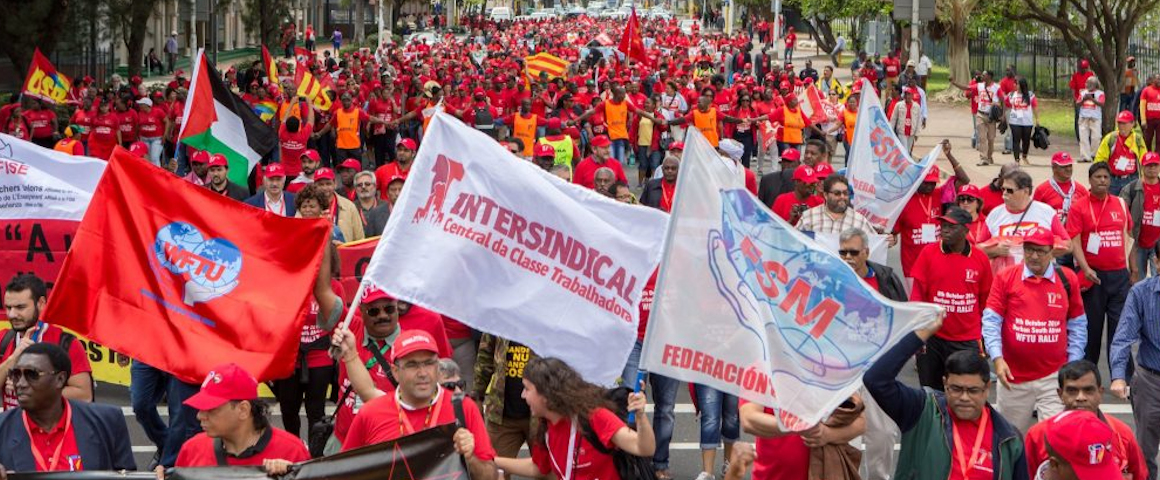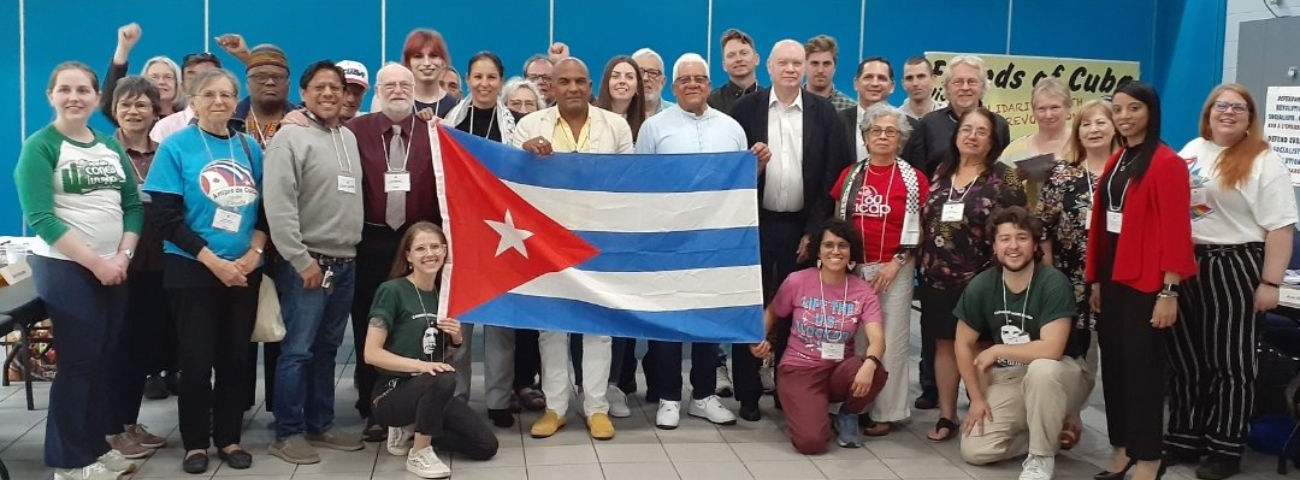The World Federation of Trade Unions (WFTU) recently published a report – The Present and Future of Work – that places this question in the context of our capitalist, imperialist society. In doing so it reveals why our Canadian labour movement is in paralysis.
The WFTU represents more than 97 million workers in 130 countries including those from most of South America and Africa, India, China, Vietnam, the Democratic Peoples’ Republic of Korea, Cuba, Europe, Russia, the Middle East, and many more. There are two features that differentiate it from the International Trade Union Confederation (ITUC) and the International Labour Organization (ILO) to which the Canadian labour movement is aligned. The WFTU is a “class-oriented international trade union organization, which has as its prime objective the emancipation of the working people by means of struggle”. It is also virulently anti-imperialist.
The report, available at the WFTU web site, provides an assessment of the current state of global working conditions. On one side is the international capitalist ruling class, whose aim is to convince workers that scientific and technological change is able to improve profit margins, but not current or future working conditions. On the other side are reformist trade union leaderships, including those in Canada, who hope to improve working conditions through ‘social dialogue’ by institutionalizing tripartite relationships among labour, employers and the government. The WFTU see their role as convincing the workers of the world of the need class struggle and that the only hope for improvement is to unite workers internationally, in struggle.
The statistical overview of the current state of work includes stark glimpses of the ravages of capitalism:
- 1% of the population possesses more than 80% of produced wealth, while 4.5 billion people live in poverty and misery.
- 218 million children aged between 5 and 17 work, while 152 million children are victims of child labour. Half of these children work in heavy, dangerous jobs. [The ILO defines child labour as work that is physically, socially or mentally harmful to the child and interferes with their schooling.]
- 2.3 million workers are killed annually by occupational “accidents” and disease.
- The retirement age is increasing, and in some countries, workers are forced to work until their 70’s in hazardous and unhealthy workplaces
- 75 million young workers are unemployed and 158 million live below the poverty line. 25% of young workers aged 15-29 are not in employment, education or training.
- Women account for less than 40% of total employment, but account for 57% of part-time workers.
- Almost 60% of working women – 750 million – do not have the legal right to maternity leave, and of those who do, 66% do not have income coverage during their leave.
- 781 million people over 15 years old remain illiterate, two-thirds of whom are women.
- 68.5 million people are refugees or migrants. Over 50% are under the age of 18.
- Between 2012 and 2014, there were 63,251 victims of trafficking in 106 countries and territories, but the actual number of victims is much higher. The majority, 71%, are women and girls who are forced into sexual exploitation. There is an increase in people victimized by modern slavery.
- More than a billion people live with some form of disability. 200 million face significant difficulties in daily living.
Armed conflict is a key factor pushing workers to migrate to other countries, where they are “used as a cheap and flexible workforce, most often without access to healthcare, proper housing, with undeclared work and without rights.”
Imperialism exacerbates the descent into Dickensian working conditions as countries apply economic sanctions, embargos and encourage coup d’états, like the one in Venezuela. The report states, “expenditure on military equipment and on imperialist organizations such as NATO, burdens workers and poor people’s strata while engaging them in dangerous plans.”
The rapid advancements of technological change are not being used to meet the world’s social needs. Currently, world unemployment is over 200 million and thousands of plants and factories are being closed. The destruction of productive forces in the face of growing unmet social needs is the tragedy of our society under capitalism. We have the ability to meet the global demand for food, shelter, healthcare, education and other fundamental human needs, but we are stuck in the inhumanity of the growing capitalist crisis.
What about the future of work? The WFTU insists that the struggle ahead is to convince workers that they can live without the capitalists, but that without workers, capitalists will die. Those who are afraid of technological change and especially the introduction of Artificial Intelligence (AI) in the workplace, must be convinced that the struggle to improve working conditions is an ideological struggle.
How does this impact the work of trade unionists in Canada? The Canadian Labour Congress (CLC) is firmly planted in the “social dialogue” side of world forces through their focus on lobbying and participating in government-led panels. Hassan Yussuff, commenting on the new three-year agri-food pilot program which will provide an additional 2,750 permanent residency opportunities for temporary foreign workers said this:
Canada’s unions are committed to seeing this pilot succeed. A tripartite approach with unions, employers and government working together is the best way to ensure that this program is successful.
Unifor, who disaffiliated from the CLC last year, promotes strategic voting, invites Liberal leaders to address their conventions and conferences, and are key participants in free trade negotiations with government partners. And they do so while working conditions deteriorate across the country and auto plants close one after the other.
But this isn’t the whole picture for workers in Canada.
Unions like the Canadian Union of Postal Workers (CUPW) and United Food and Commercial Workers (UFCW) have begun organizing drives with workers in the gig economy – CUPW has just completed a vote to represent Foodora couriers and UFCW is signing up Uber drivers. As employers carve up our bargaining units and more and more workers are marginalized by temporary, part-time and contingent work, these unions are fighting back by organizing.
The Ontario Federation of Labour (OFL) under former President Sid Ryan established the Common Front with over 100 community and labour organizations, to demand improved living conditions for all Ontarians, not just those workers in unions. The mobilizing efforts were thwarted, however, by the machinations of right-wing labour leaders who forced Ryan to retire so they could ‘save’ the OFL from class struggle unionism. We need to defeat these kinds of leaders, to continue the urgent work of mobilizing and building active community and labour solidarity.
Grass-roots unionists are demanding more action from their labour leaders – and local unions are taking more strike actions to stave off concessions and assert their power. CUPE Ontario is about to launch strike votes for their 55,000 education workers across the province. Steelworkers on Vancouver Island are standing strong against an employer who has asked them to give up their pension plan, the long-term-disability plan, seniority and allow the introduction of a two-tier wage plan.
The WFTU report re-centres the discussion of the future of work on the main enemy, by noting that a humane future is not possible under capitalism. It is the responsibility of the international labour movement to fight for the liberation of the working class from exploitation. The CLC, Provincial Federations of Labour, Labour Councils, affiliates and local labour unions need to incorporate this class-struggle ideology into their everyday work. We can do so by ensuring campaigns to support migrant, temp, casual, contingent, racialized, queer, disabled and young workers are funded and organized. We can do so by ensuring that the pensions we fight for are not contributing to oppressive regimes in other countries. We can do so by fighting for environmental and social justice for our communities. We can do so by ensuring that concrete indigenous solidarity is realized. We can do so by opposing NATO and other imperialist infrastructures that run counter to working class interests. We can do so by ensuring we create meaningful relationships with working people in our communities, our province, our country and around the world.
There is no time to lose.




